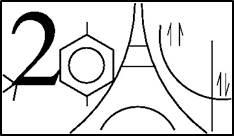This work theoretically investigates the CO dissociation on Fen nanoparticules, for n in the range from 1 to 65, focusing on the size dependence in the context of the initial step for the Fischer-Tropsch reaction. CO adsorbs molecularly through its C-end, on a triangular facet of the nanoparticle. Dissociation becomes easier when the cluster size increases. C atom is bonded to a square facet that is generated as a result of the dissociative adsorption, if it does not yet exist in the bare cluster, while the O atom is adsorbed on a triangular facet. Despite the small size of the iron cluster considered, fluctuations due to specific configurations do not influence properties for n>25 and global trends seem significant. Finally, the use of a support (TiO2-110 facet) can enhance significantly the dissociation energy or make it favorable. The case of study of Fe4 is presented.
|
|
|
Planning > Contributions par auteur > Jedidi AbdesslemCO dissociation on magnetic Fen clusters
1 : King Abdullah University of Science and Technology
(KAUST)
-
Site web
King Abdullah University of Science and Technology P.O.Box 55455 Jeddah 21534, Saudi Arabia -
Arabie saoudite
2 : Laboratoire de chimie théorique
(LCT)
-
Site web
CNRS : UMR7616, Université Pierre et Marie Curie (UPMC) - Paris VI, Université Pierre et Marie Curie [UPMC] - Paris VI
Tour 12-13, 4ème étage, 4 place Jussieu, Case Courrier 137, 75252 PARIS -
France
|
| Personnes connectées : 1 | Flux RSS |

|

 PDF version
PDF version